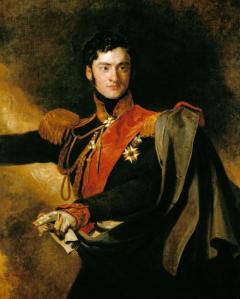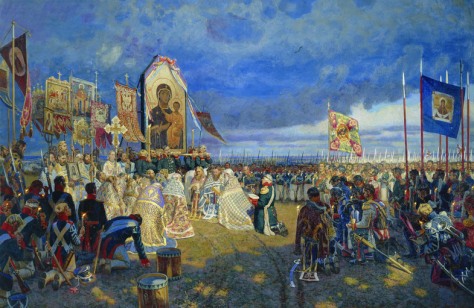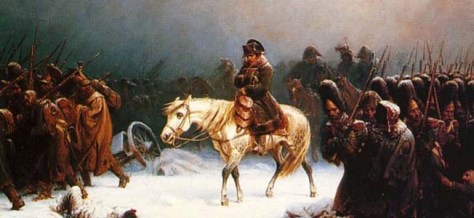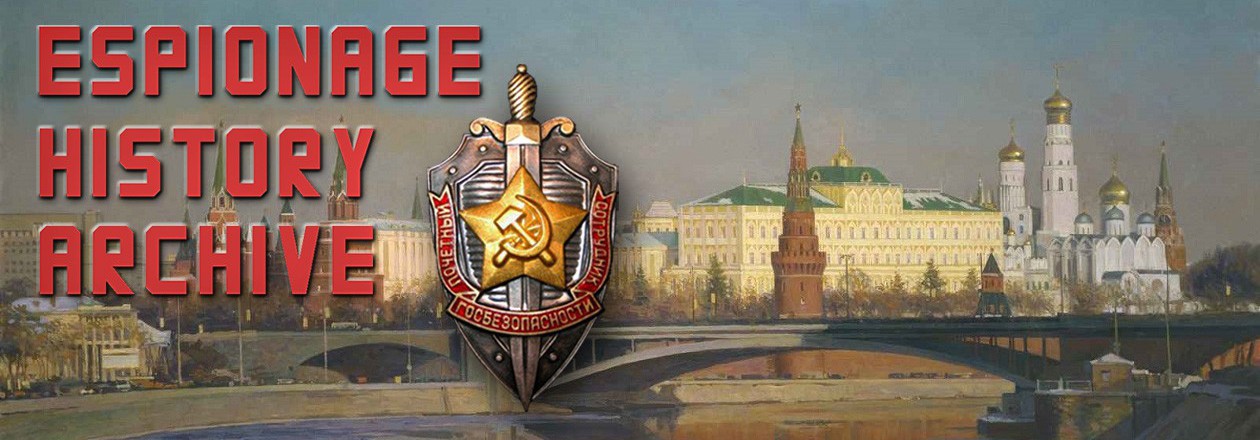Napoleon Bonaparte’s fateful invasion of Russia, known as the Fatherland War, was not only a titanic military clash, but also an espionage duel between Russian and French intelligence. The archives of the Russia’s Foreign Intelligence Service (SVR) reveal a classic true spy story set in Napoleon’s Paris, one filled with intrigue, adventure, and stolen secrets.
Alexander I of Russia and Napoleon I of France were the two main protagonists and antipodes of a military-political drama that played out on the battlefields of Europe at the very beginning of the 19th century. Both the Russians and French were watching each other vigilantly, understanding well that confrontation and military conflict were inevitable. In these conditions the acquisition of timely, reliable, and secret information on the designs and actions of the potential adversary took on a significance of the first degree.
Historians assert that the idea on the utility of obtaining paid “friends” – informants – came upon Alexander I after a secret discussion in Erfurt with French Foreign Minister Talleyrand, who to spite Napoleon informed the Russian Tsar about the French Emperor’s plans. However matters might have transpired, after the conversation with Talleyrand, Alexander undertook a number of mobilization measures and ordered the dispatch to Paris of a young and capable representative who could verify information coming from Talleyrand and inform the Russian autocrat on the situation in France and its preparations for military conflict. Alexander I’s emissary was the son of a young noble line, Aleksandr Ivanovich Chernyshev.
Aleksandr Chernyshev was born on December 30th, 1785, into the family of a lieutenant general who was also a senator and governor-general of the Kostroma region. In accordance with the existing custom at the time, from childhood Aleksandr was enrolled in military service as a sergeant-major in the cavalry. In 1801 he happened to be present at Alexander I’s coronation and was personally introduced to the Emperor. The youth produced quite a favorable impression, and soon with Alexander I’s assistance he joined the Cavalry Guards Regiment as a cornet. For the Battle of Austerlitz he received his first military award – the St.Vladimir Cross 4th Degree and a golden sword.

In February of 1808, combat veteran Chernyshev was sent to Paris with a personal letter from Alexander I to Napoleon. In March of 1809, Emperor Alexander charged Chernyshev with representing him personally on Napoleon’s military staff during the French army’s actions against Austria and Prussia. From 1810 Chernyshev was constantly in the court of the French emperor.
***
In the space of a moment, a ferocious fire erupted in the house of the Austrian ambassador, Prince Schwarzenberg. A silk curtain had suddenly ignited from one of the candles placed in a crystal sconce, and then the fire jumped over to the antique furniture, dry as powder, and began to devour a luxurious parquet that had been shined to mirror perfection. And nearby, literally two steps from the fiery nightmare beyond the doors, music sounded as lovely pairs spun in a whirlwind of reckless dancing – victims of fate from the Paris elite – who suspected nothing of what was underway.
Who among the dancers would have supposed that this festive evening would be the last for many of them? In the rush and panic, in a sea of raging fire, dozens of people perished. And there would have been even more if not for the quick thinking of one of the guests, a young guardsman, who immediately organized a group of dare-devil rescuers. One after another they threw themselves into the fire, seizing yet another helpless victim from the hell of the blaze. The hero’s name was Aleksandr Ivanovich Chernyshev.
Before the tragic night at the house of the Austrian ambassador, Chernyshev’s name could be seen only in the society pages and rumor mills of local Paris newspapers. A tall, handsome man with an unruly head of wavy hair, a wonderful and witty storyteller, without fail he would become the life of any company, especially where there were beautiful women present. In the high-society salons the opinion of the Russian Tsar’s emissary as a playboy and successful conqueror of women’s hearts was undoubtedly in currency. He was fancied by Napoleon’s sister, the Queen of Naples. Meanwhile, according to gossip, another sister of the French Emperor, the impetuous Polina Borgese, was said to be a lover of the curly-haired Russian rogue.
But that was only a theatrical mask. The reputation of a capricious Lothario served as a fine cover for the Tsar’s wily and intelligent emissary, who almost always was able to obtain important information on Napoleon’s political and military plans on the eve of the Franco-Russian conflict of 1812. Colonel Chernyshev was one of the first seven Russian “military agents” whom then-War Minister Barclay de Tolly sent to the capitals of a number of European states as officers of the Special Chancellery – a special organ of Russian foreign intelligence[i]. Aside from Chernyshev, de Tolly also sent Lieutenant G.F. Orlov; Colonel F.V. Teil Von Seraskerken, a Dutchmen by origin; Colonel R.E. Renin, the descendant of a Scottish immigrant (Vienna, Berlin); Lieutenant P.I. Brozin (Madrid); Lieutentant P.H. Grabbe (Munich); and Major V.A. Prendel (Dresden). In his youth Prendel was imprisoned in France for revolutionary struggle. Like other heroic intelligence officers – F. Vintsingerode, D. Davydov, and A. Finger – Prendel commanded a partisan detachment during the Fatherland War of 1812.
The activity of the Special Chancellery was carried out in three directions:
- Organization of strategic intelligence (acquiring abroad strategically important secret information)
- Operational/tactical intelligence (collection of data on enemy forces on Russian borders)
- Counterintelligence (detect and neutralize Napoleon’s agent networks)
The idea for forming such a highly secret state intelligence service belonged to Barclay de Tolly.
In the summer of 1810, Barclay set before Alexander I the matter of organizing the activity of Russian intelligence abroad and requested permission to send special military agents to Russian embassies to collect information “on the number of forces; their order; armaments and morale; the condition of their fortresses and stores; the capabilities and merits of their best generals; the character and spirit of the people; the economic disposition; the internal resources of the powers and their means of continuing a war; and various conclusions provided on offensive and defensive operations.”[ii] These military agents would be placed in diplomatic missions under the cover of civilian bureaucrats and officials of the Ministry of Foreign Affairs.
The apparatus of officers of the Special Chancellery was not very large at all; beyond the seven already-mentioned external intelligence agents, there served a director who was subordinate directly to the Minister, three expediters, and one translator. Before March 19th, 1812, the director’s post at the Special Chancellery was occupied by the Tsar’s adjutant A.V. Voeikov, a man close to Barclay, who had begun military service many years before as an orderly of the famed Suvorov. Namely Colonel Voeikov recommended Chernyshev for work in Paris, and he wasn’t wrong in his selection.

Chernyshev, a “lion of the salons,” quickly won the Emperor of France’s trust and was on good terms with many of his inner circle. Within a short period, the Russian colonel was able to form a network of informants in Paris’s government and military spheres, as well as arrange and expand the activities of figures bought off for large – including personally funded – sums. One of them, an officer of the French War Ministry by the name of Michele, became publicly known after a Napoleonic guillotine’s sharp blade deprived one of Colonel Chernyshev’s most valuable secret assets of his life.
Michele was part of a group that every two weeks would compose a briefing, limited to one exemplar, on the numerical strength and dislocation of the French armed forces for Napoleon personally. Colonel Chernyshev’s agent would secretly copy the document, rewriting neatly it by hand, and then pass the material to the Russian intelligence officer. Chernyshev, in turn, would hurriedly send a courier with the secret report to St. Petersburg. “Why could I not have a few more ministers like this young man?” Alexander I wrote in the margin of one of the messages from Paris. At that time Colonel Chernyshev was just 26 years old.
Along with the copy of Napoleon’s secret briefing, Chernyshev often attached his own observations and conclusions, in particular on the personnel among France’s top military figures. Here are preserved excerpts of “portraits” of Napoleon’s generals, as written by Chernyshev:
Oudinot, Duke of Reggio. Noted in all the French Army as possessing the most striking bravery and personal courage, the most capable of producing a breakthrough and generating enthusiasm in the forces under his command. Of all the marshals of France, he alone may be used with the greatest success in cases where one must execute an order requiring accuracy and fearlessness. Not being a very educated man, Oudinot doesn’t suffer from a lack of knowledge; his distinguishing characteristics are common sense, great frankness, and honesty. Both friends and enemies unanimously grant him that.
Lefebvre, Duke of Danzig. Marshal of Spain and senator. Received no education; being a deeply ignorant person, he has only great experience and much bravery and fearlessness. Incapable of acting independently, he can, however, successfully carry out the operations ordered of him. Marshal Lefebvre is around 55-60, but he is still fresh and of strong health.
Davout, Duke of Auerstadt, Prince of Eckmühl. Marshal of the Empire, supreme commander of forces in the north of Germany. A crude and brutal man, hated by all who surround Emperor Napoleon. A zealous supporter of the Poles, he is a major enemy of Russia… At the present time he is the marshal who has the most influence on the Emperor. Napoleon trusts him more than anyone else, and uses him most enthusiastically, confident that whatever his orders, they will be executed accurately and literally. Not revealing any special bravery under fire, he is very firm and stubborn, and, moreover, he is able to make everyone else obey him. This marshal has the unhappiness of being extremely short-sighted.
De Grouchy. Marquis of the Empire, colonel-general of the horse chasseurs. Not influential and is quite far from those favors rendered by Napoleon to his other comrades. In moral terms this general enjoys popular respect, the result of a spotless reputation and impeccable behavior. He is an officer of great virtue and has deep knowledge of military affairs, especially concerning the cavalry.[iii]
In such a manner Barclay de Tolly could report to Tsar Alexander not only on the general political situation in France at the beginning of the 19th century, but also communicate important information on the state of its armed forces and provide profiles of the highest-level military brass.
Colonel Chernyshev’s tour of duty in Paris ended rather unexpectedly. The French police organized extensive surveillance around him, not allowing for any suspicious meetings or trips to go unnoticed. The police came to understand that the “reckless Lothario and rogue” had long been playing them for fools, and they decided “neutralize the dangerous Russian colonel.” But for a report to Napoleon, they needed weighty evidence of Chernyshev’s impermissible activity. And, alas, such clues were found. A mislaid note from Michele, found during a covert search of Chernyshev’s home when he had gone to St. Petersburg, enabled them to establish the name of its author; after that everything was very simple. In Paris newspapers there appeared materials inspired by the police, from which it was clear that Colonel Chernyshev was engaged in espionage. Aleksandr Ivanovich didn’t return from St. Petersburg – he saw Paris again already after the victory over Napoleon, serving there as an adjutant in the victorious Tsar’s retinue.
The Emperor of France naturally expressed “righteous anger” over the “Colonel Chernyshev affair,” although he himself in every way encouraged espionage activity by the French special services, fairly assuming that to refuse such forms of action would mean to “have one less chance for success during war, or it would purchase success at the price of greater efforts and losses.” Not in vain was it shown in Russian documents from 1810 to 1812 that on the territory of the Russian Empire there were detained and neutralized 39 civilians and soldiers activated by foreign intelligence services. The statements of the English ambassador in Russia in those years, Sir Robert Moray, are curious in this regard. He deemed that in the 18th and 19th centuries, Russia was the “main center of espionage,” and he admitted that his own government assigned him up to 100,000 pounds for espionage and the bribery of Russian officials. Along with that Sir Robert claimed that France spent even more on these objectives, which threatened it with “near bankruptcy.”[iv]

History has preserved information on one “French pseudo-spy,” a certain quartermaster in the Russian Army, D. Savon, who on his own initiative announced his wish to work with Russian intelligence. When in May of 1812 Napoleon’s special emissary L. Narbonne arrived to reconnoiter the situation on the eve of French forces’ advance onto the territory of the Russian Empire, Savon was able to establish “business contact” with Narbonne and covertly pass “information” specially prepared by the Russian general staff. Within that information was contained very convincing intelligence on Barclay de Tolly’s serious preparations for immediate resistance to Napoleon right in the border zone after the Grande Armee’s crossing of the Russian frontier. Historians have noted that Napoleon was seriously dismayed when instead of the expected resistance and a pitched battle with the Russian Army during the initial period of the campaign, he encountered no advance by Russian military units, much less the expected counter-strike.
Tsar Alexander awarded Chernyshev, and with the beginning of the war, he was sent into the active army. His experience with intelligence work in Paris and his professional intelligence sense were of great use in organizing the partisan movement in areas occupied by Napoleon’s forces, and he became one of its active participants. Receiving the rank of general of the cavalry and the title of serene prince, in 1832 Aleksandr Ivanovich was appointed war minister, serving twenty years at this post. Various opinions exist with regard to evaluations of his activity as war minister, especially in the later period, the years preceding the Crimean War. Yet we must give him his due: there remains much documentary evidence of how Chernyshev devoted much attention to issues of the Russian Army’s technological rearmament. On his personal initiative, often with the signature of the Emperor himself, intelligence assignments to acquire foreign models of the newest types of weaponry were sent to Russian embassies abroad. The crown of this intelligence officer’s career was a most high position – chairman of the State Council.
[i] См. ЦГВИА, ф.ВУА, я.417, лл.189об.~202.
[ii] Там же.
[iii] ЦГВИА, ф.846, оп.16, д.3599, лл.1—5.
[iv] Richard Deacon. А Ніstory of the Russian Secret Service. — London, 1987. — Р.20.
Work Translated: Очерки истории российской внешней разведки: В 6-ти тт. 0-95 — Т.1: От древнейших времен до 1917 года. — М.:Между- нар. отношения, 1995.
Translated by Mark Hackard.


Reblogged this on Jay's Analysis.
LikeLike